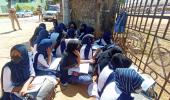'I am not in favour of the hijab myself.'
'I personally think it wrong to make women shut themselves out of the world, where there is so much to see.'
'But I can't dictate to others about what they should wear.'

There have been many controversies, and violence associated with such controversies in the recent past.
The recent controversy has also a name, the hijab controversy that started on a pre university college campus in Udupi and has been rocking other campuses in coastal Karnataka.
Sahitya Akademi Award-winning novelist Shashi Deshpande -- whose father was the legendary Kannada novelist and playwright Adya Rangacharya -- tells Rediff.com's Shobha Warrier about what is happening in her home state.
The first of a two-part interview:
We spoke in 2015 when you along with many writers returned Sahitya Akademi awards after minority institutions in India were attacked. At that time you told me, bringing religion into public life was a dreadful mistake.
Now, religion has become all pervasive. In fact, it has infected young minds on campuses too. How dangerous is this?
So dangerous that I am frightened for the future of our country.
What will happen when we have two groups of people hating each other? Opposing each other?
We have seen -- at least my generation has -- what Partition did to us.
Are we going to have a similar situation today?
And only because politicians find polarisation profitable for themselves?
You had also said then that you found any ban, 'whether on what we write, what we eat, how we dress etc absolutely abominable. They have no place in a democracy'.
How do you see this college in Udupi trying to impose dress restrictions and banning religious symbols like hijab in the camps?
This can be seen as something more than what it seems on the surface.
We have always seen women in India going about in a burqa or a hijab. Nobody thought anything about it. It was just their choice.
Now we suddenly have the authorities, and then the students objecting to the hijab, forbidding the girl students from entering the college. How does it affect them?
I am not in favour of the hijab myself. I personally think it wrong to make women shut themselves out of the world, where there is so much to see. But I can't dictate to others about what they should wear.
And why is it that women are always the ones to be told what not to wear?
Just today someone in the BJP has said that rapes happen because women wear clothes that 'excite' men. What do we do about this kind of thinking?
They want women to cover themselves, so that they are not 'excited' but they should not wear a hijab.
Women and girls have a right to wear what they want as long as it is not obscene. The same applies to men as well.
This incident has given rise to widespread agitation in Karnataka and educational institutions were closed there.
Have you seen this kind of religious division during your student days? How was the atmosphere then?
I must say 'never'.
I remember the agitation in Bombay about creating a city State out of Bombay, not part of either Maharashtra or of Gujarat. There was a huge agitation by the Maharashtrians at the time.
Later we had some demonstrations about the Portuguese rule in Goa.
These were political agitations, not religious.
Would you associate the hijab with a turban, tilak and bindi, as a religious symbol?
I don't know how far we can call these items religious symbols.
People wore headgear of all kinds, these differed according to class as well as caste.
I think today the turban is a religious symbol to the Sikhs, and it is respected as such.
So why is the hijab being singled out?
The bindi too -- somehow one never thinks of it as religious. It's more connected with one's marital status.
The kind of tilak some men have started wearing is a deliberate assertion of Hinduism.
But whether the hijab is a garment which religion demands is something which will be argued in the courts.
Should students be wearing a burqa covering the entire body if the college has a uniform?
I have no idea whether any college has a uniform. I remember one of the joys of getting out of school was not having any uniform. That is what makes a child an adult -- that you can now choose for yourself.
I would think uniforms are right for the police, for the army, not for students.
Feature Presentation: Aslam Hunani/Rediff.com










